| Music Box |
Leontief Lover's Song of the Week:
ARTIST:Ryan and Chad ft. MLB PLAYERS
SONG: I Don't Dance (MLB PLAYERS REMIX)
ALBUM: High School Musical 2

|
| Comment Box |
|
|
| Please leave your comments about our blog and the articles you have read here, if you are not a blogger. Thank you very much! :) |
| Members |
| Zerge Zandueta
20 years old and counting, this dude loves sports and videogames. he hopes to contribute something good to society one day and make other people happy
"Humanity is the virtue of a woman, generosity that of a man." - Adam Smith
Kathryn Pua
this perky girl never fails to brighten up anyone's day. very friendly, approachable and outgoing, this person enjoys going out with her barkada, though an 'introvert' at heart
"And very often the influence exerted on a person's character by the amount of his income is hardly less, if it is less, than that exerted by the way in which it is earned." - Alfred Marshall
Bea Lim
they say silent water runs deep. this girl may seem quiet at first, but once you get to know her, you're in for loads of fun
"The friend of the present order of things condemns all political speculations in the gross." - Thomas Malthus
Raymond Lee
a 23 year old korean who makes all the girls go "ga-ga." 'nuff said. ;)
"Entrepreneurial profit is the expression of the value of what the entrepreneur contributes to production." - Joseph A. Schumpeter
Carlo Medina
hypnotic on the hardcourt, this basketball icon is not only good at putting 2 on the board but 3 on the report card
"In the long run we are all dead." - John Maynard Keynes
|
| Learning Corner |
Eco Lesson of The Week : Determinants of Supply and Demand
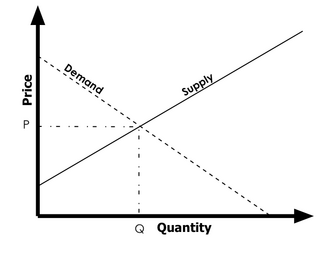
The intersection of the supply (upward sloping) and demand (downward sloping) curves is called the equilibrium pt. This point represents the price at which goods are sold and purchased at the market. However,
this equilibrium point may change depending on a shift by the curves. The curves may shift one at a time or at the same time both either upwards or downwards. An upward
shift by either curve would raise the price, while a downward shift would lower it.
What we want to know this week is what causes these shifts in supply and demand, called their determinants.
The Determinants of Supply
1. Costs of production
2. Profitability of alternate goods in supply
3. Natural occurences
4. Expectations of future prices
5. Profitability of goods in joint supply
6. The number of sellers
The Determinants of Demand
1. Tastes, fashions, preferences
2. The number and price of related goods
3. Income
4. Expectation of future prices
5. Population
Reference: http://www.cr1.dircon.co.uk/pdffiles/determinants.pdf
|
| Cartoon Corner |
By: Paul Combs (The Tampa Tribune)
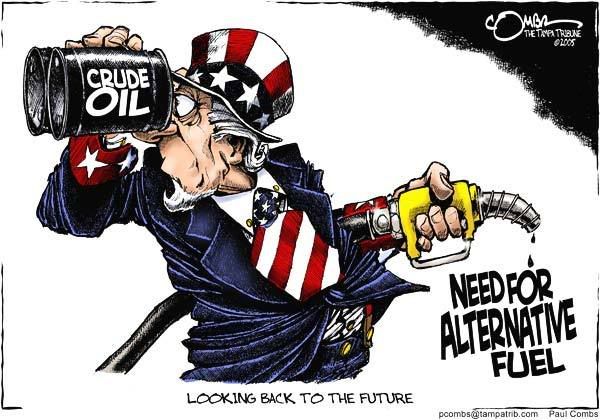
By: Clay Bennet (The Christian Science Monitor, Boston)
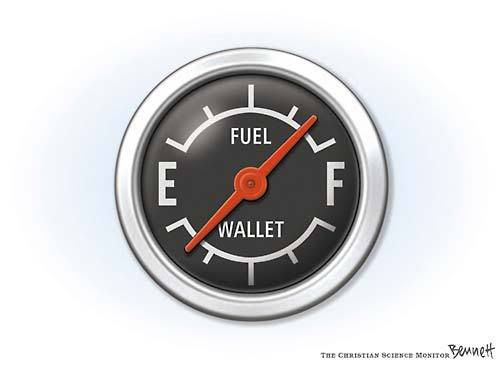
By: Thomas Boldt (The Calgary Sun, Alberta, Canada)

|
|
| Friday, October 12, 2007 |
| The Economy up in Smokes? |
The Economy up in Smokes?
by Kathryn Pua

Smoking is one of the most widespread vices in the world. It is so pervasive, in fact, that schools even like the Ateneo has provided venues for smokers -- the Smocket. While all of its negative effects are known to almost everybody, I am pushed to wonder if the world, or even at least governments, are doing anything concrete at all about discouraging smoking or trying to lessen it.
I recently came across an article in The Economist entitled "Can't Kick the Habit". Here, many issues are pointed out and what makes the article really interesting is the fact that it refutes points we naturally assume as common sense.

The first thing I saw was graph of the smokers in different Asian countries. Immediately, I thought to myself that with those shocking figures, maybe governments should use the economically-proposed means to regulate demand or supply.
As I have learned, demand can be affected by other outside forces, like powerful institutions such as the WHO (World Health Organization). One of the efforts, according to the article, undertaken by the WHO is the WHO's tobacco-control treaty (whereby countries have promised to restrict the marketing of cigarettes, curb smoking in public and help smokers quit). Despite a few successes, however, these don't seem to be enough as reflected by the figures in the graph. Some companies still manage to find their way around those policies and agreements. Perhaps a stricter implementation would bump up the WHO's success rate.
Another measure that could be undertaken is the imposition of higher taxes -- but governments, of course, are afraid it would, in the long run, decrease the market demand and consequently the revenues they get from the sale of tobacco. But recent researches, according  to the article, reveal that higher taxes are a win-win situation. Not only do they decrease consumption, they also still manage to increase government revenues. From the lessons, I can only think of one factor that accounts for this market behavior and it basically points to the elasticity of cigarettes. In order for a change in price not to affect the change in quantity much, the demand elasticity for the good must be inelastic-- meaning that consumers aren't very responsive to price changes. As my research confirms, cigarettes are indeed inelastic goods. Hence, higher taxes (which firms will attempt to pass on to consumers by increasing the price of the good) will affect some people, decreasing consumption somewhat while also increasing government revenues through higher taxes. to the article, reveal that higher taxes are a win-win situation. Not only do they decrease consumption, they also still manage to increase government revenues. From the lessons, I can only think of one factor that accounts for this market behavior and it basically points to the elasticity of cigarettes. In order for a change in price not to affect the change in quantity much, the demand elasticity for the good must be inelastic-- meaning that consumers aren't very responsive to price changes. As my research confirms, cigarettes are indeed inelastic goods. Hence, higher taxes (which firms will attempt to pass on to consumers by increasing the price of the good) will affect some people, decreasing consumption somewhat while also increasing government revenues through higher taxes.
The final method discussed by the article is a stricter watch on cigarette-smuggling. It has the same effect as higher taxes and will result in a win-win situation as well. This, for me, may have more of an effect on the supply side rather than on demand. With smaller chances to smuggle goods in, as the article points out, tobacco farmers could try growing oilseeds instead for there is a growing demand for such a product. Due to lesser raw materials available, market supply of the good will decrease as firms will be able to produce less of the goods as well.
After everything that was said, as a farewell (as if to calm the fears of profit-driven firms), the article ended by saying that "Asia's tobacco firms...have so much scope to improve their efficiency that they could boost profits even in a shrinking market."
In the end, all that's really necessary is that governments and firms (and hopefully consumers as well), work hand-in-hand to lessen smoking in countries. As seen above, government's will benefit with higher taxes and consequently a healthier labor force. Firms needn't worry about profits. Everybody wins and the economy doesn't have to go up in smokes.
source: http://www.economist.com/world/asia/displaystory.cfm?story_id=9833717 |
posted by Leontief Lovers @ 3:55 PM  |
|
|
|
|
| About Me |
|
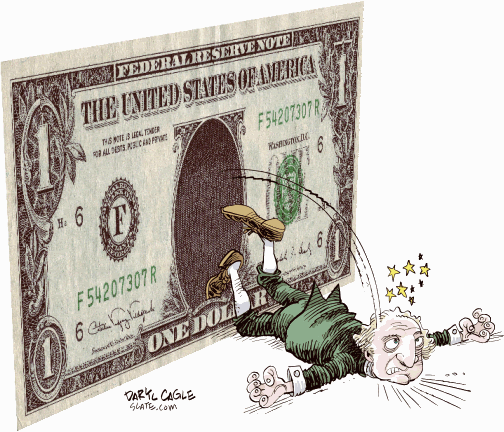
Name: Leontief Lovers
Home: Manila, Philippines
About Me: people wonder why we are called leontief lovers. it's simple, in eco, there is a canonical form of utilty and production function called Leontief Preferences / Technologies. In a two good/input world, you always would need the other good/input in order to remain satisfied/have the ability to produce... in other words, you will never substitute one good for another, you need to consume/use both goods at a fixed proportion at the same time... LIKEWISE, in our blog, WE WILL NEVER TRADE NOR SUBSTITUTE ECO FOR ANOTHER!
See my complete profile
|
| Time |
|
|
| Previous Post |
|
| Archives |
|
| Poll |
| |
| Links |
|
| Lovers Recommends |
| Books
"The World is Flat" by Thomas Friedman
"Confessions of an Economic Hitman" by John Perkins
Movies
"A Beautiful Mind"
"Wall Street"
|
| EcoBizLife |
|
| Fun Zone |
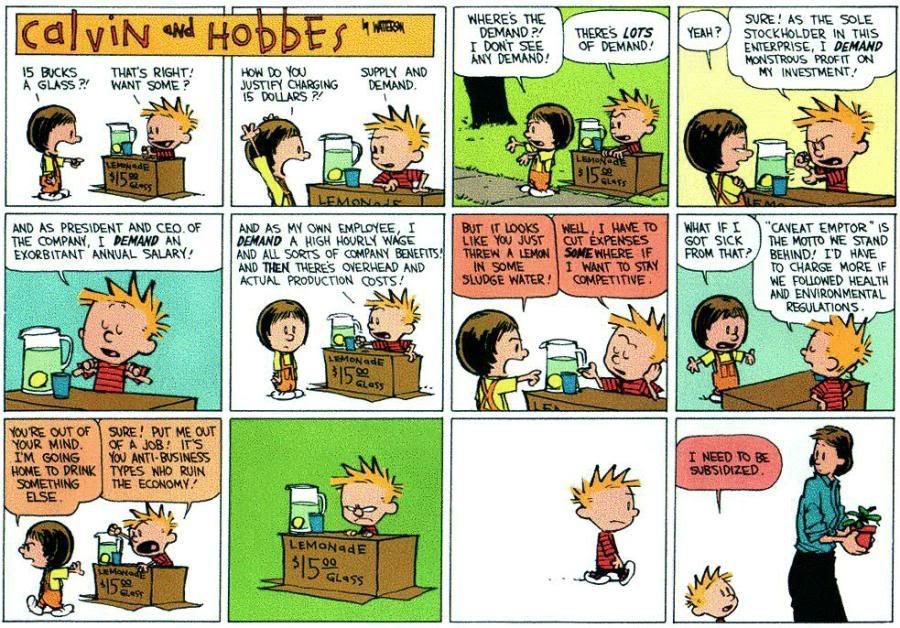
Calvin and Economics
Jokes
An economics professor and a student were strolling through the campus.
"Look," the student cried, "there's a $100 bill on the path!"
"No, you are mistaken," the wiser head replied. "That cannot be. If there were actually a $100 bill, someone would have picked it up."
Feudalism: You have two cows. Your lord takes some of the milk.
Socialism: You have two cows. State takes one and gives it to someone else.
Communism: You have two cows. State takes both of them and gives you as much milk as you need.
Bureaucratic Communism: You have two cows. State takes both of them and gives you as much milk as the regulations say you should need.
Bureaucracy: You have two cows. State regulates what you can feed them and when you can milk them. Then it pays you not to milk them. After that it takes both cows, shoots one, milks the other and pours the milk down the drain. Then it requires you to fill out forms accounting for the missing cows.
Fascism: You have two cows. State takes both of them and sells you milk.
Nazism: You have two cows. State takes both of them and shoots you.
Liberalism: You have two cows. State dosen't care whether you exist, let alone your cows.
Capitalism: You have two cows. You sell one and buy a bull.
PRICE IS IMPORTANT!
(disclaimer: may be a little off-color)
"My Dear, would you go to bed with me for a million dollars?"
"Well, yes, I guess I would."
"How about $100?"
"What kind of person do you think I am?"
"My Dear, we have already established that. We are merely haggling over the price!"
|
| Template by |

 |
|
